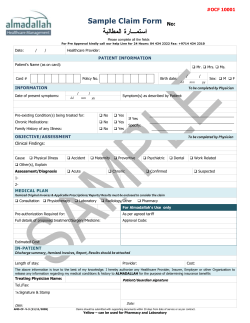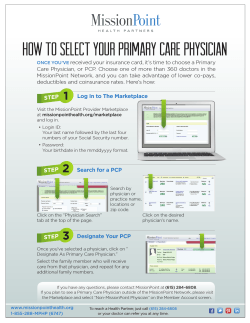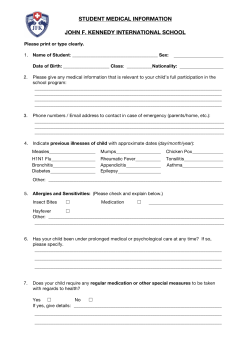
WHAT IS HEALTH INFORMATICS?
WHAT IS HEALTH INFORMATICS? Using innovative and appropriate technologies, process streamlining, and integrated best practices, regulatory compliance and standards bring vital information to health professionals and patients the moment they need it, wherever they may be – at home, on vacation, at a clinic, in an ambulance, at a patient’s bedside, or in a physician’s office. Health informatics makes smart connections and facilitates data analysis, pulling meaningful information to the surface and bringing new insights into current challenges. It meets the commitment to better patient safety and quality of care. It means patients can access all of their medical records – including prescription medications, lab results, radiology, and treatment plan – on their smartphones and communicate results from home monitoring devices back to their providers. It means a physician doing hospital rounds can access his or her patients’ complete medical history on his/her tablet, including lab results, x-ray images, and contact information for other care providers. The physician can be automatically alerted if one of his/her patients has a significant change in vital signs and has the ability to connect with patient support systems (such as family caregivers) to meet patient needs. It means clinical researchers can more easily identify research cohorts, improve patient accrual, manage protocols, receive real-time alerts of adverse events, facilitate site and patient monitoring, comply with FDA requirements, and bring drugs to market months or even years earlier. It means previously disparate information from doctors, pharmacies, labs, and insurers can seamlessly connect in one health system. Clinicians in one hospital can read results from a lab in another hospital. Administrators can perform analysis from combined system-wide data – reducing costs and stopping fraud. It carries profound implications for global health, allowing for more efficient access to and improved quality of care globally at reduced cost. It the realm of public health, it facilitates epidemiology studies, surveillance, and prevention programs. It holds the potential to move disease from acute episodal care to prevention and early detection. 1 One Research Court, Suite 200 | Rockville, MD 20850 | www.ctisinc.com | Tel: 301.948.3033 | Fax: 301.948.2242
© Copyright 2025





















